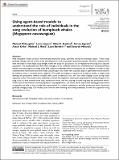Using agent-based models to understand the role of individuals in the song evolution of humpback whales (Megaptera novaeangliae)
Abstract
Male humpback whales produce hierarchically structured songs, primarily during the breeding season. These songs gradually change over the course of the breeding season, and are generally population specific. However, instances have been recorded of more rapid song changes where the song of a population can be replaced by the song of an adjacent population. The mechanisms that drive these changes are not currently understood, and difficulties in tracking individual whales over long migratory routes mean field studies to understand these mechanisms are not feasible. In order to help understand the mechanisms that drive these song changes, we present here a spatially explicit agent-based model inspired by methods used in computer music research. We model the migratory patterns of humpback whales, a simple song learning and production method coupled with sound transmission loss, and how often singing occurs during these migratory cycles. This model is then extended to include learning biases that may be responsible for driving changes in the song, such as a bias towards novel song, production errors, and the coupling of novel song bias and production errors. While none of the methods showed population song replacement, our model shows that shared feeding grounds where conspecifics are able to mix provides key opportunities for cultural transmission, and production errors facilitated gradually changing songs. Our results point towards other learning biases being necessary in order for population song replacement to occur.
Citation
Mcloughlin , M , Lamoni , L , Garland , E C , Ingram , S , Kirke , A , Noad , M J , Rendell , L & Miranda , E 2018 , ' Using agent-based models to understand the role of individuals in the song evolution of humpback whales ( Megaptera novaeangliae ) ' , Music & Science , vol. 1 . https://doi.org/10.1177/2059204318757021
Publication
Music & Science
Status
Peer reviewed
ISSN
2059-2043Type
Journal article
Collections
Items in the St Andrews Research Repository are protected by copyright, with all rights reserved, unless otherwise indicated.

